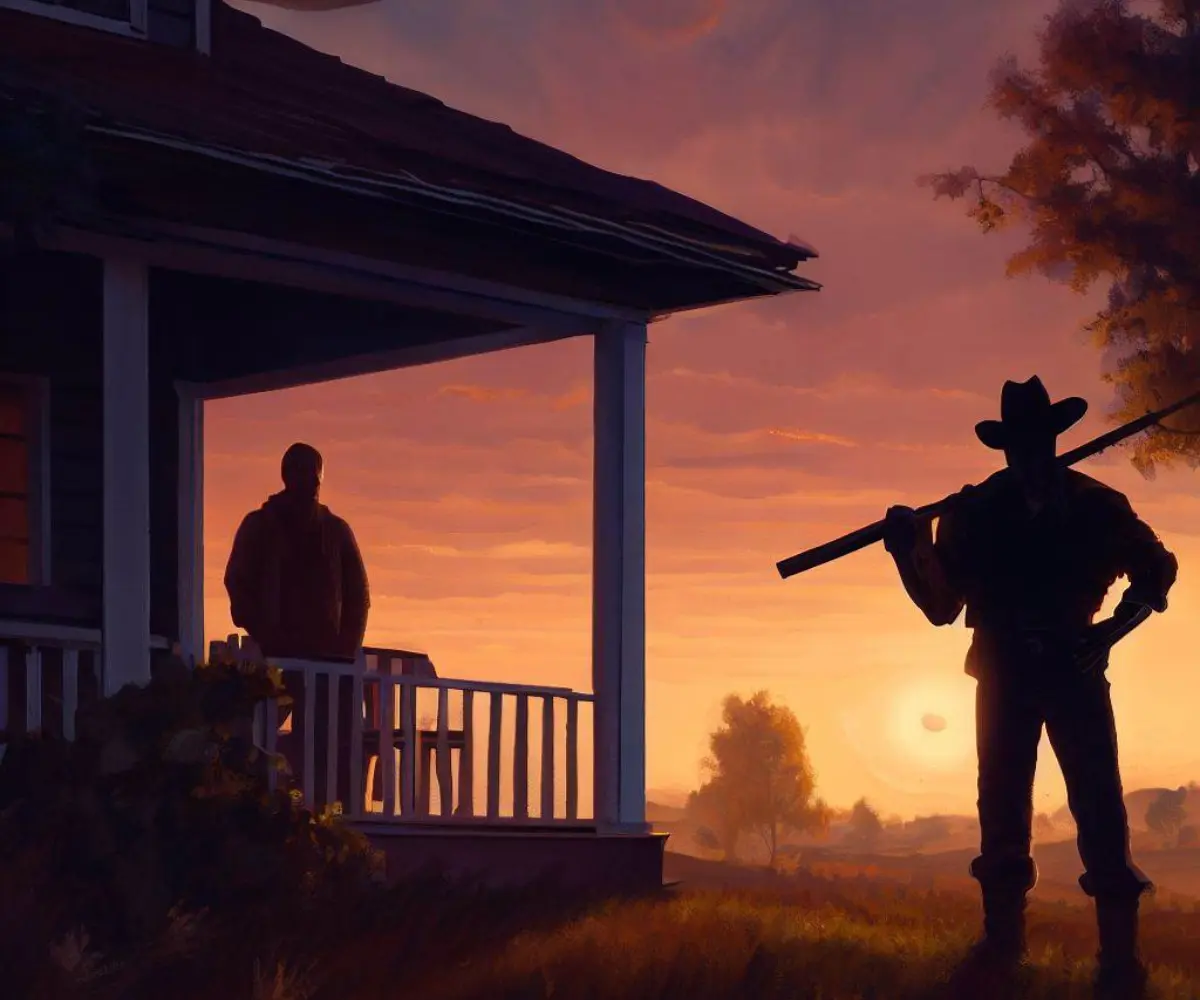The issue of whether you can shoot a bounty hunter on your property depends on the specific laws and regulations of your jurisdiction, as well as the circumstances surrounding the encounter.
In general, using lethal force against another person is a serious matter and is usually only allowed in cases of self-defense when there is an immediate threat of serious bodily harm or death.
Can You Shoot a Bounty Hunter on Your Property?
Topics Covered In This Article
- 1 Can You Shoot a Bounty Hunter on Your Property?
- 2 FAQs
- 2.1 Can I shoot a bounty hunter on my property if they enter without permission?
- 2.2 Are bounty hunters allowed to enter my property without permission?
- 2.3 Can I shoot a bounty hunter if they have a warrant for someone else’s arrest, and they mistakenly come to my property?
- 2.4 Can I use force to remove a bounty hunter from my property if I believe their actions are unlawful?
- 2.5 What should I do if I encounter a bounty hunter on my property?
- 2.6 Are there any legal protections for homeowners against bounty hunters?
- 2.7 Can I be held legally responsible for injuring or shooting a bounty hunter on my property?
- 3 Conclusion:
- 3.1 Related Articles:
- 3.1.1 What Are Limiting Factors in Hunting?
- 3.1.2 How to Clean Hunter Boots?
- 3.1.3 Does Walmart Sell Hunting Licenses?
- 3.1.4 Best Hunting Sunglasses
- 3.1.5 What Color Lenses Are Best for Hunting Glasses?
- 3.1.6 Do Polarized Sunglasses Affect Hunting?
- 3.1.7 What is the Hunter’s Most Important Item of Clothing?
- 3.1 Related Articles:
Know the Laws in Your Jurisdiction:
The laws regarding self-defense, trespassing, and the actions of bounty hunters can vary significantly from state to state or country to country. Some jurisdictions may have “castle doctrine” or “stand your ground” laws that provide more leeway for homeowners to use force in self-defense, while others may have stricter laws regarding the use of deadly force.
Research the laws specific to your location, or consult with a local attorney to understand the rights and responsibilities you have as a homeowner when faced with a bounty hunter on your property.
Understand Bounty Hunter Laws:
Bounty hunters, also known as bail enforcement agents or fugitive recovery agents, are individuals hired by bail bondsmen or bail bond agencies to apprehend fugitives who have skipped bail. Their authority and powers can vary depending on the jurisdiction. In some areas, they have the right to pursue fugitives into private property, while in others, their authority is limited.
It is crucial to familiarize yourself with the laws governing bounty hunters in your area. Some states require them to notify local law enforcement before making an arrest, while others have specific regulations on their conduct and behavior.
Evaluate the Threat:
If you find a bounty hunter on your property, remain calm and assess the situation. Determine if there is a legitimate threat to your safety or the safety of others. Shooting someone should be a last resort when faced with an imminent threat of serious harm or death.
Retreat if Possible:
In many jurisdictions, the law may require you to attempt to retreat from the situation before using deadly force. If you can safely exit the area and avoid a confrontation, this may be the best course of action.
Call the Police:
If you believe the bounty hunter’s actions are unlawful or you feel unsafe, call the local law enforcement immediately. They can handle the situation and ensure that the actions of the bounty hunter comply with the law.
Consult with an Attorney:
If you are involved in a situation where you had to use force against a bounty hunter or anyone else, consult with an attorney as soon as possible. A lawyer can review the specific details of your case, advise you on your rights, and guide you through any legal processes that may follow.
FAQs
Can I shoot a bounty hunter on my property if they enter without permission?
The answer to this question depends on the laws in your jurisdiction. In some places, you may have the right to use force, including lethal force, to defend yourself and your property from an intruder. However, in other jurisdictions, you may be required to attempt to retreat or use non-lethal force before resorting to deadly force. It is essential to familiarize yourself with the specific self-defense laws in your area and consult with a legal professional to understand your rights and obligations.
Are bounty hunters allowed to enter my property without permission?
The authority and powers of bounty hunters can vary depending on the jurisdiction. In some places, bounty hunters may have the legal right to pursue a fugitive into private property, while in others, their authority may be limited. It is crucial to understand the specific regulations governing bounty hunters in your area to know whether they can enter your property without permission.
Can I shoot a bounty hunter if they have a warrant for someone else’s arrest, and they mistakenly come to my property?
Shooting a bounty hunter in this situation is generally not recommended. If the bounty hunter has a valid warrant for someone else’s arrest and mistakenly comes to your property, using lethal force is unlikely to be justified under self-defense laws. It is crucial to communicate clearly with the bounty hunter and, if necessary, call the local law enforcement to resolve any misunderstanding.
Can I use force to remove a bounty hunter from my property if I believe their actions are unlawful?
The use of force to remove a bounty hunter from your property should be approached with caution. If you believe the bounty hunter’s actions are unlawful or you feel unsafe, it is best to call the local law enforcement to handle the situation. Using force against someone, even if you believe their actions are illegal, may result in legal consequences if not justified under self-defense laws.
What should I do if I encounter a bounty hunter on my property?
If you find a bounty hunter on your property, remain calm and assess the situation. First, ask the bounty hunter about their purpose for being there and request identification or any relevant documentation. If you believe the bounty hunter is acting unlawfully or if you feel threatened, avoid confrontation and call the local law enforcement immediately to address the situation.
Are there any legal protections for homeowners against bounty hunters?
Some jurisdictions provide legal protections for homeowners against bounty hunters, such as requiring the bounty hunter to notify local law enforcement before attempting an arrest on private property. “Castle doctrine” or “stand your ground” laws may also offer additional protections for homeowners in some states. However, the specifics of these protections can vary, and it’s essential to be familiar with the laws in your jurisdiction.
Can I be held legally responsible for injuring or shooting a bounty hunter on my property?
If you injure or shoot a bounty hunter on your property, you may be subject to legal consequences, including potential criminal charges and civil lawsuits. The legality of your actions would be assessed based on the specific circumstances, self-defense laws, and regulations regarding bounty hunters in your area. To protect your rights and understand your potential liabilities, it is essential to consult with a qualified attorney.
Conclusion:
The topic of shooting a bounty hunter on your property is complex and heavily dependent on the laws and circumstances in your jurisdiction.
It is essential to be informed about the laws related to self-defense, trespassing, and the authority of bounty hunters in your area. If faced with such a situation, stay calm, prioritize safety, and contact local law enforcement and legal counsel to handle the matter appropriately.
Remember that this guide is for informational purposes only, and you should seek advice from a qualified attorney for personalized legal advice.
Related Articles:
What Are Limiting Factors in Hunting?
How to Clean Hunter Boots?
Does Walmart Sell Hunting Licenses?
Best Hunting Sunglasses
What Color Lenses Are Best for Hunting Glasses?
Do Polarized Sunglasses Affect Hunting?
What is the Hunter’s Most Important Item of Clothing?

Walter Hendricks is a well-known authority in the eyewear industry, specializing in a diverse range of products such as gaming glasses, swimming goggles, sunglasses, eyeglasses, computer glasses, and fashionable daily-wear eyewear.
Hendricks believes in empowering his readers with in-depth information to help them choose the right glasses that blend functionality and fashion, catering to their unique lifestyle requirements.
His comprehensive reviews and informative articles provide clear insights on everything from cutting-edge gaming glasses to the latest trends in eyewear fashion. Through his work, Hendricks has proven his dedication to helping consumers make informed eyewear decisions that support both their visual needs and style preferences.

